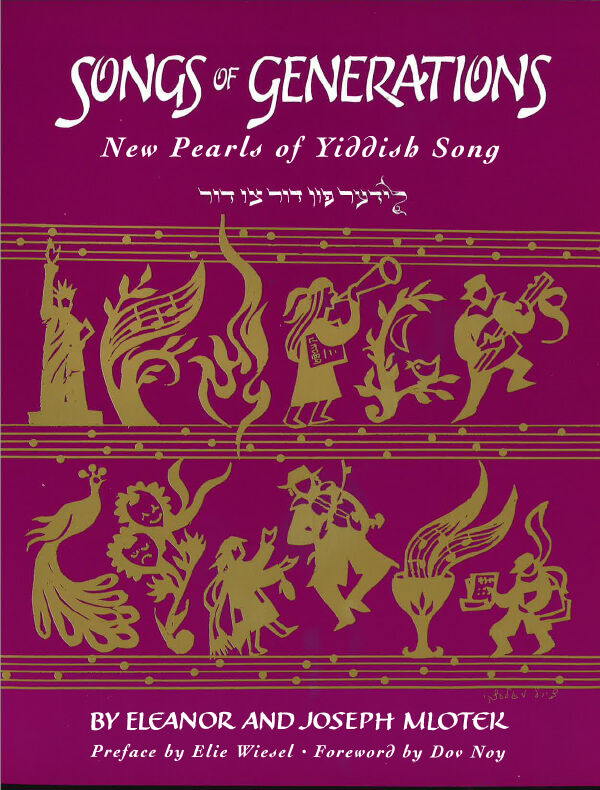Poem by H. Leivick, based on the End-of-Days prophecies of Isaiah. Melody based on the refrain of a Yiddish folksong Shmerl mit dem fidl, Tevye mitn bas. The song was transcribed by compilers from a record-cassette of Sarah Gorby, Songs of the Ghetto. A few of Leivick’s lines were adjusted to fit the melody. According to the informant who submitted it to the Perl, the song was sung at a Ghetto Memorial in Paris.

Keep dreaming, great prophet, your dream.
Show yourself again above the ruined walls.
Never mind that he who is calling you sits, weary,
he is mourning a little boy who lies, incinerated.
A wolf shall lie together with a sheep,
and a little boy will lead them by the hand.
Meanwhile, come, prophet, console his mother,
who wails, mourning her little boy who lies, incinerated.
A leopard shall be embraced by a kid–
they will have recognized each other;
the mother rocks an empty cradle, lulls and lulls,
the little boy lies dead, burnt to ashes.
A cow shall walk with a bear to pasture,
a snake shall approach a child with kindness,
but up to now we have been bad guardians –
the little boy lies dead, burnt to ashes.
His mother climbs out from the bunker’s depths
turning to you with her swaying hands,
oh, prophet, prophet bring the End of Days,
resurrect the little boy who lies, incinerated.
Dayn kholem groyser novi, kholem vider,
Bavayz zikh vider iber khorevdike vent,
Nit kuk vos der vos ruft dikh zitst a mider —
Dos klogt er oyfn yingele vos ligt farbrent.
A volf dart voynen mit a sheps tsuzamen,
Dos yingele darf firn zey mit zayne hent, —
Dervayl kum, novi, brengen treyst der mamen,
Vos klogt-baklogt ir yingele vos ligt farbrent.
Tsum lempert darf a tsigele zikh tulyen —
Zey zoln hobn beyde zikh derkent;
Di mame vigt a puste vig, tut lulyen, lulyen,
Dos yingele ligt toyt, oyf ash farbrent.
A ku darf shprayzn mit a ber oyf fiter,
Mit gutskeyt tsu a kind zol zayn a shlang genent,
Nor mir zaynen geven biz itster shlekhte hiter —
Dos yingele ligt toyt, oyf ash farbrent.
Di mame shtaygt aroyf fun bunker-t’homen
Mit ire vigndike hent tsu dir gevendt;
O novi ,novi, breng dem akhris hayomim
Makh lebedik dos yingele vos ligt farbrent.
דײַן חלום, גרױסער נבֿיא, חלום װידער,
באַװײַז זיך װידער איבער חרובֿדיקע װענט,
ניט קוק װאָס דער װאָס רופֿט דיך זיצט אַ מידער —
דאָס קלאָגט ער אױפֿן ייִנגעלע װאָס ליגט פֿאַרברענט.
אַ װאָלף דאַרף װױנען מיט אַ שעפּס צוזאַמען,
דאָס ייִנגעלע דאַרף פֿירן זײ מיט זײַנע הענט, —
דערװײַל קום, נבֿיא, ברענגען טרײסט דער מאַמען,
װאָס קלאָגט־באַקלאָגט איר ייִנגעלע װאָס ליגט
פֿאַרברענט.
צוס לעמפּערט דאַרף אַ ציגעלע זיך טוליען —
זײ זאָלן האָבן בײדע זיך דערקענט;
די מאַמע װיגט אַ פּוסטע װיג, טוט לוליען, לוליען,
דאָס ייִנגעלע ליגט טױט, אױף אַש פֿאַרברענט.
אַ קו דאַרף שפּרײַזן מיט אַ בער אױף פֿיטער,
מיט גוטסקײט צו אַ קינד זאָל זײַן אַ שלאַנג גענענט,
נאָר מיר זײַנען געװען ביז איצטער שלעכטע היטער —
דאָס ייִנגעלע ליגט טױט, אױף אַש פֿאַרברענט.
די מאַמע שטײַגט אַרױף פֿון בונקער־תּהומען,
מיט אירע װיגנדיקע הענט צו דיר געװענדט;
אָ נבֿיא, נבֿיא ברענג דעם אַחרית־הימים,
מאַך לעבעדיק דאָס ייִנגעלע װאָס ליגט פֿאַרברענט.
Song Title: Un A Yingele Vet Zey Firn

The Songs of Generations: New Pearls of Yiddish Song anthology comprises songs that were either never printed before or appeared in rare and inaccessible publications — sometimes in different versions and without proper sources. Most of the songs in this book were submitted by readers of Chana and Yosl’s column “Perl fun der yidisher poezye” (Pearls of Yiddish Poetry) in the Yiddish newspaper Der Forverts (The Forward), initiated in October, 1970. Over 25 years, thousands of songs were collected in correspondence and on cassettes from readers throughout the world, and they represent a veritable national Yiddish song archive. Chana Mlotek, in her introduction, writes, “In the course of years the inquiries, contributions and enthusiasm of these readers have kept our own interest unflagging and have reinforced our dedication to this effort. And in recent years our participants have also been augmented by new readers from the former Soviet Russia, who receive our newspaper there or from newly-arrived immigrants in this country and Israel.”